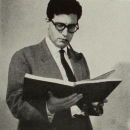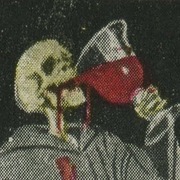|
 Viruses and how we communicate about them and respond to them has been a research interest of mine for a long time, so these past few months have been some monkey's paw bullshit for sure. Last year I was putting together a reader of literature about plague/contagion and quarantine but it felt in poor taste to finish it in the current climate. But it sounds like at least some people are interested in the topic, so here are some of my notes/suggestions. This list is intentionally light on genre fiction given its original purpose. There is also a bias towards Anglo + French lit. I am less interested in pandemics as a backdrop "excuse" to justify post-apocalyptic settings. I also do not give even a solitary poo poo about zombies. Here's my reading list. I mostly talk about the plot/setting here as a hook to see if it sparks your interest, but for most of these I'm more interested in how the language is used and the themes are explored than the events per se. The usual suspects
Slightly less well-known plague lit
Short stories/novellas
Books about plague/outbreaks that have been prior TBB books of the month (linked to the discussion threads):
Other goon suggestions (that i haven't read):
Non-fiction
Plague or quarantine "moods" (subjective/a stretch i know)
More genre-y stuff we could talk about if you want i guess
Somebody fucked around with this message at 05:41 on Mar 27, 2020 |
|
|
|

|
| # ? May 5, 2024 21:24 |
|
I just finished rereading Blindness and, of course, I like it even more than my first time years ago. There's an excerpt from Seeing at the end, but I'll give myself a little time before I dip into that. Love your architecture analogy, the later parts of the book really do feel like you can breathe easier. Even while things are still super bleak, there are funny and tender moments. I really like Saramago's writing where you kind of putter along and he hits you with something. It's like playing a nice game of catch where they occasionally throw a medicine ball at you. Skoora fucked around with this message at 04:23 on Mar 27, 2020 |
|
|
|
I mentioned elsewhere that I'm reading The Plague. It's good stuff, I'm only about halfway through so I can't say much other than it being extremely well written. Last year I read The Dog Stars by Peter Heller, which takes place after a flu pandemic & has some pretty good meditations on loss and closure and the beauty of life. Stylistically it is similar to The Road, but it is much more hopeful (admittedly not a high bar lol).
|
|
|
|
Krankenstyle posted:Last year I read The Dog Stars by Peter Heller, which takes place after a flu pandemic & has some pretty good meditations on loss and closure and the beauty of life. Stylistically it is similar to The Road, but it is much more hopeful (admittedly not a high bar lol). how much zen and the art of motorcycle maintenance are we talking, here
|
|
|
|
Tree Goat posted:how much zen and the art of motorcycle maintenance are we talking, here Not really any, tho tbf it's been a couple decades since I read Zen.
|
|
|
|
I had a weird flu apocalypse trilogy a few years ago of reading Dog Stars, Far North, and Station Eleven back to back I think my big issue with Dog Stars was that it seemed to assume the natural state of man was violent mistrust. While each story dealt with the collapse of society, Dog Stars seemed the most pessimistic about how a crumbled world would look. Like, within months it was all just people beating each other to death with sticks for cans of beans. I think Far North was my favorite of the three, although i definitely found Station Eleven to perhaps be the most "honest" portrayal of a society after a viral apocalypse
|
|
|
|
Far North was real good too. I thought Station 11 was a bit idk "light", but maybe that was mostly because I thought the titular comic book was a lame device. I guess there is a lot of violence in Dog Stars, but there's humanity as well. Anyway I guess we'll see the true nature of man soon enough
|
|
|
|
I mean, if you look at historical examples of societal collapse it tends to go far more like station eleven where power is centralized around pre-existing institutions and emphasis is placed upon the preservation of pre-collapse society, much like the post-Roman Europe. Both Dog Stars and Far North seem to suggest we are heading more towards a Mad Max style every man for himself situation and I don't think history or human nature warrants that level of pessimism
|
|
|
|
Yeah that makes sense. Speaking of, A Canticle for Leibowitz has those themes of institutional continuity & preservation as well.
|
|
|
|
there are so many interesting social dynamics to explore (how institutional power is built and preserved, how in-groups and out-groups form, foucault-style accountings of bio-power, etc etc) that i've always thought using a virus as an easy device to make an apocalypse happen but leave enough infrastructure around for people to gawk at/watch rust is somehow a bit of a waste. books like the mosquito coast and heart of darkness can all tackle some of these themes without just jumping straight to the dystopian cannibal future
|
|
|
|
Castle to Castle sounds very interesting, and I've heard the author is pretty nuts. How well does his batshit insanity translate to English?
|
|
|
|
Celine has had mostly great translators(Ralph Manheim ftw) who translated his style to English quite accurately and maintained the ellipses and general feel, although iirc Celine also liked to use super unintelligible archaic French words that you can't replicate easily in English.
|
|
|
|
The Siege of Krishnapur fits the bill well I think. There's the literal cholera that plagues the besieged (including an entertaining "duel" between two doctors who disagree over how to mitigate and treat the outbreak), but also the claustrophobia, the upending of normal life, and the question of what to sacrifice in the name of survival.
|
|
|
|
I'm listening to The Plauge kind of enjoying it, even though some of it is WAY too real for me. My partner and I have had to live separately for the first time in our relationship and it's been hard but then of course a loving pandemic happens. I feel so seen by the descriptions of the townspeople coping with their missing partners, how they would get depressed on a Saturday afternoon or Sunday because that was their usual time to hang out. It's the first time I've read Camus, I don't know what I was expecting but it definitely didn't expect to have my teen like angst about my separation from my partner put to paper so well haha. I love how he nails the boredom and anxiety induced by a pandemic. Such a good book so far, I've just started Part Four.
|
|
|
|
I've heard that Mary Shelley's The Last Man might fit the bill, although I admit I haven't read it. A story about the last man alive after a plague and the failure of art and romanticism may hit a bit too harshly.
|
|
|
|
My favorite epidemic novel is probably Borislav Pekić’s Besnllo (Rabies). He was a Serbian author exiled to London for being a royalist, also a very good writer. Rabies (1983), subtitled as “a genre novel”, is a pastiche of the seventies and eighties disaster thrillers in the vein of Hailey’s Airport, but with excellent prose and heavily laden with biblical references and allegories. It all starts with a nun petting a dog named Sharon in a plain near Meggido in Israel. The nun returns to London but there is an obvious outbreak of an infectious disease on the plane. The staff at Heathrow bungles the isolation measures upon arrival and the entire Terminal 2 is exposed. The disease turns out to be a modified form of rabies with the usual symptoms - hydrophobia, convulsions, aggression - but the onset is just a few hours and the virus isn’t affected by the vaccines because it has an additional, obviously engineered, protective layer. There is a race to develop a new vaccine in a mobile lab set up on Heathrow, leaning heavily on the research of a scientist posing as an Israeli but actually an escaped Nazi scientist who experimented on Auschwitz inmates. In the end, it is revealed that he was behind the original virus, which was a product of his program to develop the superhuman. The vaccine is tested on the protagonist and his love interest who are then transformed into Nietzschean ubermenschen and immediately start fighting for dominance atop the control tower. The RAF helicopter pilot witnessing the two naked figures wrestling reports that Heathrow is lost. Jets with nukes are dispatched to sterilize it. Unfortunately, it was never translated into English.
|
|
|
|
Now that I come to recommend it I'm terrified it isn't going to live up to reading it as an edgy 19 year-old, but William S Burrough's Ghost of Chance is a pretty good time. There's a cosmic zoo with one of every extinct organism deep beneath a libertarian commune in Madagascar. Some miners drill into it and release the 1 microbe of every single plague that ever died out and they're all vaguely magical-realist. It's like Invisible Cities except instead of cities it's diseases.
|
|
|
|
A recent entry into the Plague Genre I'd recommend is Severance by Ling Ma (2018). This one strays the edge of post-apocalyptic/sci fi, and is of course a modern metaphor for cultural stagnation, nostalgia and capitalism and all that good stuff, but takes a somewhat more realistic approach to the spread of a pandemic (which is actually a fungal infection spread globally through book material importation from a source in China). When people contract the infection, they become effectively braindead and are stuck performing rote, repetitive tasks they did in their normal life perpetually until their body eventually withers and dies from neglect. The novel cuts back and forth between a group of survivors after the plague and to the days of when the plague was setting, and parts of the depiction of society's reaction feel very accurate to what is happening now. Ma also is careful to note that the victims are decidedly not zombies (despite some critics comparisons) and has said the book was explicitly inspired by recent epidemics and natural disasters. Here's a quote from an interview with Ling Ma from the past week or so, commenting on coronavirus: Ling Ma posted:Much of what inspired “Severance” were catastrophes of the recent past: Hurricane Sandy, the SARS virus, the Ebola outbreak, multiple cases of blackouts in New York, including one caused by Hurricane Ernesto, etc. I experienced some of these events firsthand as I was writing the novel — including the 2011 Snowpocalypse of Chicago, when the buses and other vehicles were trapped overnight on Lake Shore Drive by the extreme snowfall. There was no way to get to work the next day. I was thinking about how companies respond to catastrophe, and the way that work culture calibrates around it. When I first started writing “Severance,” I saw it primarily as work novel, with the global supply chain as the setting. Link to the interview: https://www.chicagotribune.com/entertainment/books/ct-books-ling-ma-whiting-award-0325-20200325-iklv6daldvdinout5rmkdis4dq-story.html TrixRabbi fucked around with this message at 15:35 on Mar 30, 2020 |
|
|
|
oh lol i left out masque of the red death
|
|
|
|
this article is somewhat rambly and unfocused in its thesis, but it does hang its narrative around Evans’ Death in Hamburg: Society and Politics in the Cholera Years, 1830-1910, which sounds fascinating, although my library is suspiciously sans ebook for it
|
|
|
|
Forgot to mention that i finished The Plague last week, and it was excellent. It's only my second Camus (after The Stranger) but I loved that as well and it was years ago I read it so idk why I haven't read more. It's pretty easy to read the plague itself as fascism/ww2, which it surely is, but it is also a plague. I think Camus purposely chose the plague as a sort of stand-in to remove all humanity from the transgression & thus let the handful of protagonists and their ideas of morality stand for themselves. There are no Germans in the book that I recall. While I was reading, I thought Cottard was kindof an rear end in a top hat. He's the guy with the secret past, fearful of getting caught, but who suddenly livens up when everyone is having a hard time, and I guess I can see it a little bit. Being as I am a massive [sic] introvert, I've had that compulsion to cross the street when people were walking towards me. Now everyone is crossing away from everyone. It's no longer weird. Idk. Anyway I think it's a very good book, and you dont have to read it as a metaphor or roman a clef. its mostly about how people react to a bad situation, how they justify powering through or giving up.
|
|
|
|
malapropos, there was an opinion piece in a weekly newspaper here which was about how she (the journo writing the piece) could suddenly viscerally understand and empathise with the dread that common flu symptoms invoked in Jane Austen’s novels
|
|
|
|
it has come up a couple times in the lit thread recently, but a general theory of oblivion is currently free as an ebook and centers around a woman trapped in an apartment amidst events that feel thoroughly outside of her control, so it seems relevant. it's a very quick read as well so check it out if you can screen-read https://archipelagobooks.org/book/a-general-theory-of-oblivion/
|
|
|
|

|
| # ? May 5, 2024 21:24 |
|
I read Bruno Jasienski's I Burn Paris a couple weeks ago and it was a fantastic book. While it is decidedly anti-capitalist, it takes a fair share of shots at Communists, Bolsheviks, the lot. It is definitely a more extreme version of a plague, more along the lines of Camus' plague, with Paris being isolated from the outside world and the book examining the citizens responses to breakdown of chaos. Jasienski is extremely cynical, though, and it is apparent through the book, the dude was definitely curmudgeonly, bitter with many/most. Reading about the author a bit after finishing the book helped me reflect more fully on the themes and what I perceived as "flaws" with the characters, but ultimately I think were just reflections on the author's worldview.
|
|
|
|























